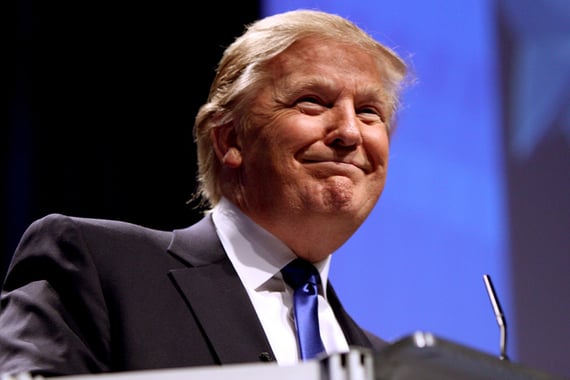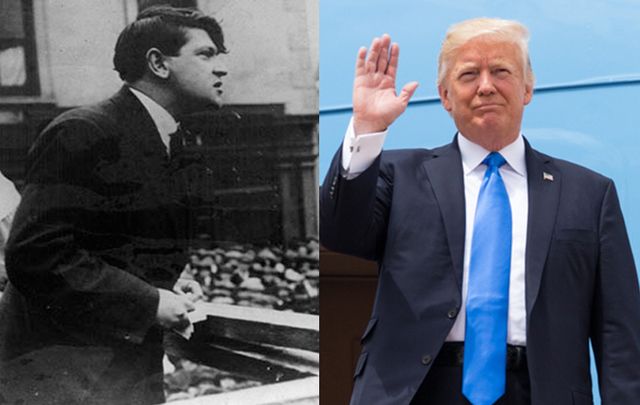What do Michael Collins and Donald Trump have in common? Why, a meeting with an infamous Russian Vladimir, of course.
Did you know that there’s more than one sinister “Vladimir” associated with Russia?
Vladimir Numero Uno is Lenin. He’s been dead since 1924, but he still sits in the Kremlin in pristine condition 93 years after his death. Basically, he’s stuffed to perfection.
Russian Vladimir Numero Dos is the present Russian oligarch, Vladimir Putin, friend to dictatorships and one President of the United States, Donald J. Trump. The romance was going great until Special Counsel Robert Mueller put the brakes on it. Putin, scorned, declared that Trump was “not my bride, and I am not his groom.”
Thank God. That was close. But I bet the first night of the honeymoon would have been a PPV sellout. It would probably end with Putin, bare-chested, riding off into the sunset, leaving his bereaved Donald behind, heartbroken. It would make the perfect cover for a paperback romance novel.
But I digress. Did you know that Michael Collins, the greatest of Irish revolutionaries, has a connection to the other Vladimir, Lenin, the legendary Russian revolutionary who put the word “Communist” in the American dictionary?
Read more: Vladimir Putin tried to help Irish Olympics head accused of touting
A book on Michael Collins revealed he may have more in common with President Trump than you would think

Irish hero Michael Collins also allegedly spent an afternoon with the Russians.
We know this because of an obscure, but wonderful book called Enchanted by Dreams: The Journal of a Revolutionary by Joe Good. Good was a London Irishman, born and raised by Irish-born parents, but when it came time for an uprising in Dublin, he was all in and ready for action.
Good’s great distinction was that he knew a fellow rebel in London named Michael Collins. And, to put it mildly, Good knew how to stick the needle in the self-important Irish Republican Brotherhood (IRB) rebel from County Cork. They called Collins “The Big Fellow” and today most think it was because of his size, about 6’ tall and close to 200 pounds, big for an Irishman in those days. That might have been the case to some, but Big Fella also referred to the size of Collins’ ego and the way he could push people around. I think this is the way a bemused Joe Good felt about Collins.
On Easter Monday 1916, Collins was in the GPO, the pristine Staff Captain attached to Commandant-General Joseph Mary Plunkett, soon to be executed by the British. Good, a regular foot soldier, was about three blocks down Sackville Street at the corner of Bachelors Walk, occupying Kelly’s Fort. The building is still there, still pockmarked with bullet holes. For years it was the headquarters of Kapp & Peterson, the tobacconist. Today it is a Starbucks.
Michael Collins' afternoon with Vladimir Lenin was revealed by a fellow inmate at Frongoch

Vladimir Lenin. Image: Public Domain/WikiCommons.
After the 1916 Rising, Good and Collins found themselves at Frongoch, the prison camp for Fenians in Wales. “We relieved the monotony by rough horseplay,” wrote Good. “Mick would stand on a staircase and tackle all coming or going to the dormitory above us. I don’t know how he or I managed to survive it at times, for some of our opponents were very strong countrymen who could have hurt us but for their good temper. Certainly, Mick and myself were not gentle. And his favorite remark to me, after some devilment, was, ‘Joe—you’ll be hanged yet.’ ”
Good’s rough affection for Collins is told in this anecdote: “Great-hearted Mick… I had fought him always—and always admired him. He knew men’s and women’s hearts and how to move them. Of all the remarkable men I’ve had the honor to call my comrades during this period, he was the one with the stamp of greatness. My wife, May, was to meet him on only one occasion. And her memory of that single encounter—he asked her for a dance at a céilí—was treasured throughout her life. ‘That Michael Collins,’ she would often say, ‘once smiled at me.’ ”
Read more: Michael Collins' long-lost letter to fiancée Kitty Kiernan
Was Trump and Putin's relationship as innocent as Collins' interaction with Lenin?

Do we think Trump's relationship with the Russians is just as innocent? Image: WikiCommons.
In all the biographies I have read about Collins, the one succulent historic fact that is always omitted is that Collins and Lenin spent an afternoon together. Good, clearly relishing how he needled Collins, tells of an encounter which took place at Frongoch with the future Minister for Finance in the first Dáil [Irish parliament]: “Once they were discussing economics and, as I was passing, I said to Mick: ‘What the hell do you know about economics?’ He almost jumped into the air. This was pretty chancey—I had read nothing then on the subject myself and was a deal younger than Mick. I joked that some famous economist had spoken to me. I did not say it was a lecture Lenin had given in London. At least I knew that Lenin could be described as an economist, but that was all I knew on the topic at that time. To my surprise, Mick had also been to the same lecture. The Clonakilty lad had certainly got around.”
Of course, no one knows what impact Lenin’s lecture had, if any, on Collins the economist. Today, Collins is known for many things—ruthless gunman, chief negotiator of the Anglo-Irish Treaty—but often his job as Minister for Finance is overlooked, a job he loathed because of all the near occasions of sin that the money presented to people. The Loan was a tremendous success raising $5,100,000 overseas, mostly in America, and £375,000 in Ireland itself. Without this money, it is doubtful that the revolution would have been successful.
See Michael Collins soliciting funds for the National Loan at Padraig Pearse’s school, St. Enda’s in Rathfarnham, Dublin, in 1919:
There are not many comparisons between Trump and Collins. But thanks to Joe Good we can say with certainty that The Donald and The Big Fellow did, at some point, collude with a Russian named Vladimir.
Dermot McEvoy is the author of the "The 13th Apostle: A Novel of Michael Collins and the Irish Uprising" and "Our Lady of Greenwich Village", both now available in paperback, Kindle, and Audio from Skyhorse Publishing. He may be reached at [email protected]. Follow him at www.dermotmcevoy.com. Follow The 13th Apostle on Facebook here.




Comments